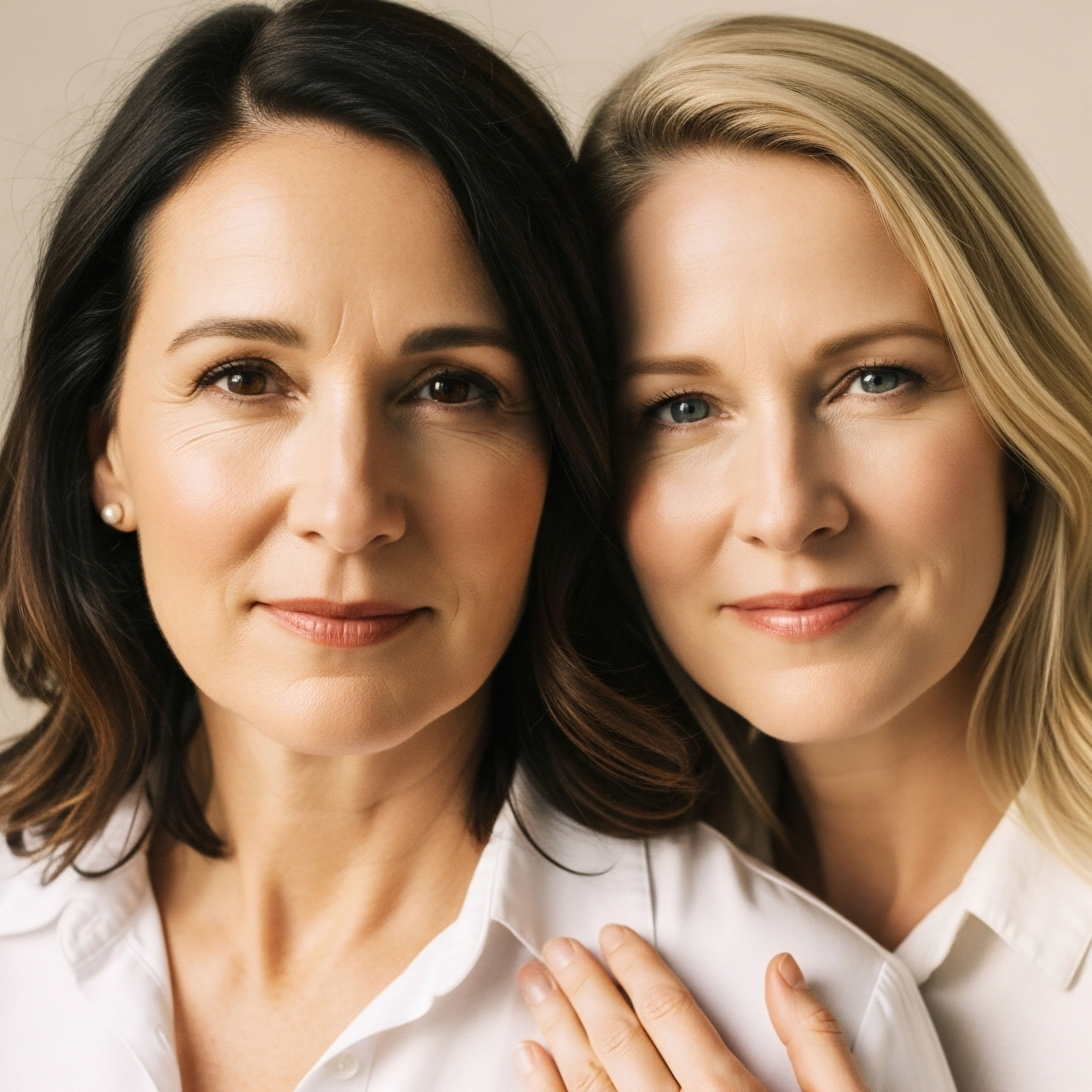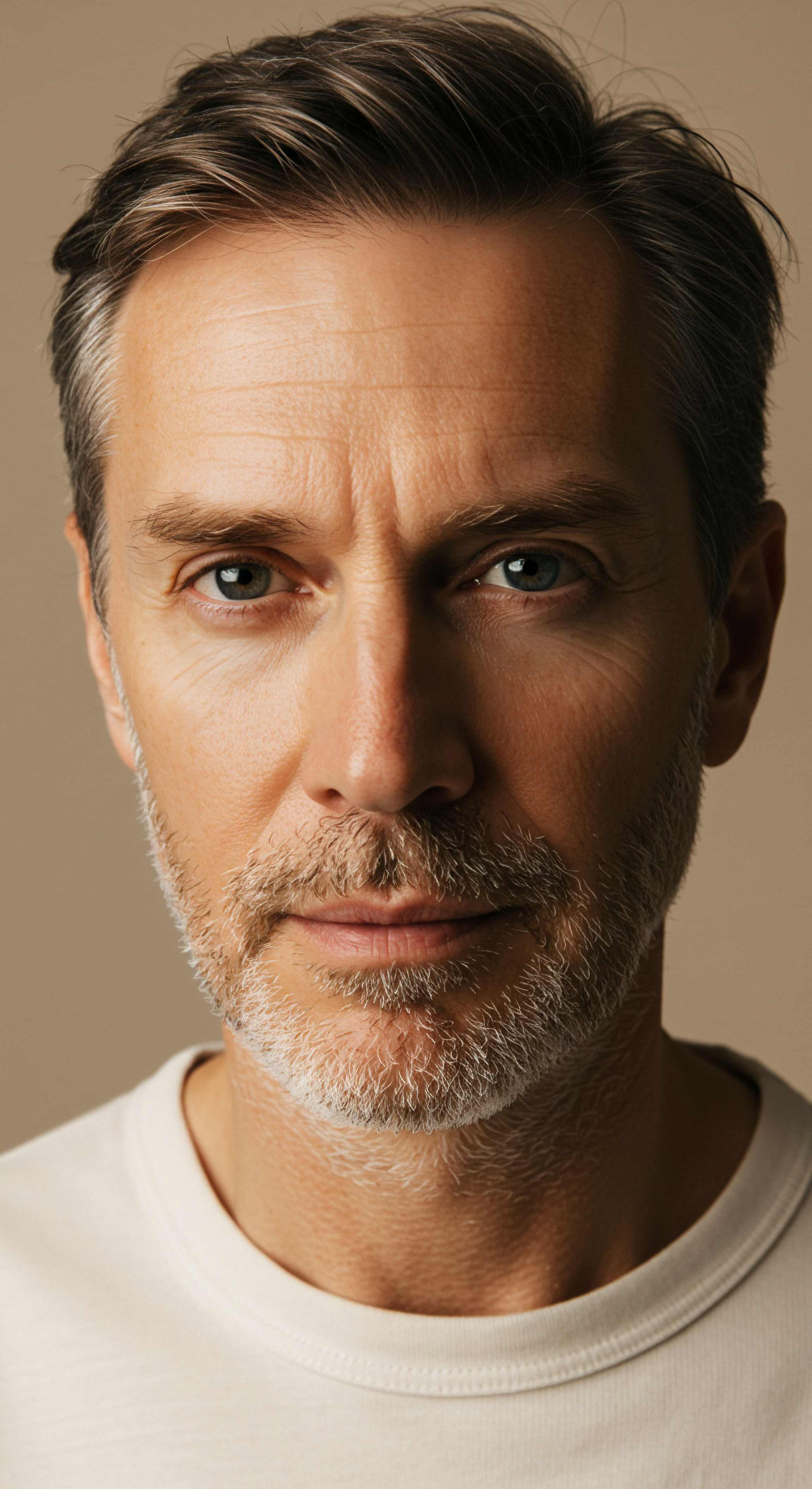

Reclaiming Your Vitality
The subtle shifts in one’s well-being ∞ a creeping fatigue, a recalcitrant metabolism, a dimming of the intrinsic drive ∞ often prompt a search for understanding. These sensations frequently arise from the intricate symphony of our internal biochemical messengers, the hormones.
A core element in this endocrine orchestra involves androgen receptors, cellular structures acting as precise antennae, receiving signals from androgens such as testosterone. The responsiveness of these receptors, termed androgen receptor sensitivity, dictates how effectively these crucial signals translate into biological action, profoundly shaping one’s experience of vitality and function.
Understanding androgen receptor sensitivity unlocks insights into your body’s nuanced communication system, guiding a path toward renewed well-being.
The concept of cellular receptivity extends beyond mere presence; it encompasses the efficiency with which a cell perceives and responds to a chemical messenger. Consider a radio receiver ∞ its ability to pick up a signal depends not only on the signal’s strength but also on the receiver’s tuning and internal integrity.
Similarly, robust androgen receptor sensitivity means the body’s tissues can effectively utilize available androgens, even at physiological concentrations, to maintain muscle mass, bone density, cognitive acuity, and a healthy metabolic rate. When this sensitivity wanes, a cascade of suboptimal physiological responses can ensue, manifesting as the very symptoms that compel individuals to seek answers.

Androgen Receptor Function
Androgen receptors reside within the cytoplasm of target cells, poised to translocate to the nucleus upon androgen binding. This nuclear translocation initiates a complex genomic signaling cascade, influencing the transcription of specific genes. These genes govern a vast array of physiological processes, from protein synthesis in muscle tissue to neurogenesis in the brain.
The functional integrity of these receptors, from their synthesis and proper folding to their interaction with co-activator and co-repressor proteins, significantly impacts the ultimate biological outcome.

How Does Lifestyle Influence Androgen Receptor Responsiveness?
Lifestyle interventions wield considerable influence over the intricate molecular machinery that governs androgen receptor sensitivity. Dietary choices, patterns of physical exertion, sleep architecture, and psychological stress all contribute to the cellular milieu, shaping receptor expression, binding affinity, and post-translational modifications. These external inputs translate into internal biochemical signals, either enhancing or diminishing the cell’s capacity to respond to androgenic cues. Recognizing this profound connection empowers individuals to proactively calibrate their internal environment, optimizing hormonal signaling for sustained health.


Optimizing Receptor Signaling
For individuals seeking to refine their endocrine function, particularly concerning androgen receptor sensitivity, a strategic integration of lifestyle modifications offers a potent avenue. These interventions extend beyond generic health advice, targeting specific biological pathways that modulate receptor expression and activity. The objective involves creating an internal environment conducive to optimal androgenic signaling, complementing or enhancing the effects of clinical protocols.

Dietary Architectures and Androgen Receptor Dynamics
The composition of one’s diet directly impacts cellular metabolism and, by extension, receptor function. Macronutrient balance, micronutrient adequacy, and the presence of bioactive compounds collectively influence androgen receptor sensitivity.
- Protein Intake ∞ Adequate protein consumption provides the necessary amino acid precursors for receptor synthesis and repair, supporting the structural integrity of these crucial proteins.
- Healthy Fats ∞ Essential fatty acids, particularly omega-3s, contribute to cell membrane fluidity, which can influence receptor trafficking and signaling efficiency.
- Micronutrients ∞ Zinc, magnesium, and Vitamin D serve as cofactors for numerous enzymatic reactions involved in hormone synthesis and receptor function. Zinc, for instance, directly influences androgen receptor binding and DNA interaction.
- Phytonutrients ∞ Certain plant compounds, such as those found in cruciferous vegetables, can modulate estrogen metabolism, indirectly impacting the androgen-to-estrogen balance and thus influencing androgen receptor signaling.
Strategic nutritional choices act as a foundational element, directly influencing the cellular machinery that governs androgen receptor responsiveness.

Exercise Protocols and Androgen Receptor Expression
Physical activity, particularly resistance training, represents a powerful stimulus for enhancing androgen receptor expression in skeletal muscle and other tissues. The mechanical stress and metabolic demands imposed by exercise trigger adaptive responses at the cellular level.
Resistance training protocols typically involve structured sessions aimed at muscle hypertrophy and strength development. These activities induce micro-trauma and subsequent repair, necessitating increased protein synthesis and heightened androgenic signaling for tissue remodeling. The acute post-exercise elevation in circulating androgens, coupled with chronic adaptations in receptor density, creates a synergistic effect that amplifies the anabolic drive.

Metabolic Interplay with Androgen Receptors
Insulin sensitivity plays a considerable role in modulating androgen receptor function. Hyperinsulinemia, often associated with insulin resistance, can negatively affect androgen receptor sensitivity and lead to dysregulation of steroid hormone synthesis. Conversely, interventions that improve insulin sensitivity, such as caloric restriction or intermittent fasting, can indirectly optimize androgen receptor responsiveness.
| Lifestyle Factor | Mechanism of Influence | Clinical Relevance |
|---|---|---|
| Resistance Training | Increases AR expression, enhances post-receptor signaling pathways. | Augments muscle protein synthesis, supports bone density, complements TRT. |
| Nutrient Density | Provides precursors for AR synthesis, cofactors for function, modulates inflammation. | Supports overall endocrine health, optimizes hormonal balance. |
| Sleep Optimization | Regulates diurnal hormone rhythms, reduces inflammatory markers. | Improves HPG axis function, sustains nocturnal testosterone pulses. |
| Stress Management | Mitigates cortisol-induced AR downregulation, preserves HPG axis integrity. | Maintains anabolic-to-catabolic balance, enhances overall well-being. |


Molecular Mechanisms of Receptor Modulation
A deeper examination of how lifestyle interventions shape androgen receptor sensitivity necessitates a descent into the molecular and epigenetic landscape. The cellular response to androgens involves a complex interplay of receptor dynamics, co-regulator availability, and the chromatin environment. Lifestyle choices influence these parameters through intricate signaling cascades, ultimately determining the efficiency of genomic and non-genomic androgen actions.

Epigenetic Regulation of Androgen Receptors
Epigenetic modifications, including DNA methylation and histone acetylation, represent a sophisticated layer of gene expression control, directly impacting androgen receptor gene transcription. Dietary components, such as folate and methionine, serve as methyl donors, influencing DNA methylation patterns.
Similarly, compounds like butyrate, produced by gut microbiota from dietary fiber, can inhibit histone deacetylases (HDACs), leading to increased histone acetylation and a more open chromatin structure, thereby enhancing androgen receptor gene expression. This epigenetic plasticity provides a compelling mechanism by which long-term dietary patterns can program cellular responsiveness to androgens.
Epigenetic modifications offer a compelling molecular explanation for how sustained lifestyle choices can program androgen receptor sensitivity.

The Interplay of Insulin Signaling and Androgen Receptor Function
The intricate cross-talk between insulin signaling and androgen receptor pathways presents a critical axis for metabolic and hormonal health. Insulin resistance, characterized by impaired cellular glucose uptake, often correlates with reduced androgen receptor sensitivity. Hyperinsulinemia can increase sex hormone-binding globulin (SHBG) production, thereby reducing free, bioavailable testosterone.
Beyond this, insulin signaling directly influences post-receptor events. For example, the activation of the PI3K/Akt pathway by insulin can phosphorylate androgen receptors, altering their nuclear translocation and transcriptional activity. Conversely, lifestyle interventions that enhance insulin sensitivity, such as high-intensity interval training (HIIT) and specific dietary approaches, indirectly potentiate androgen receptor function by optimizing this critical metabolic milieu.

Inflammation and Glucocorticoid Receptor Crosstalk
Chronic low-grade inflammation, often a consequence of suboptimal lifestyle, can significantly impair androgen receptor sensitivity. Inflammatory cytokines, such as TNF-α and IL-6, activate signaling pathways (e.g. NF-κB) that can interfere with androgen receptor nuclear translocation or promote its degradation. Moreover, chronic stress elevates cortisol, a potent glucocorticoid.
Glucocorticoid receptors, when activated, can directly compete with androgen receptors for binding to common response elements on DNA, or they can induce the expression of co-repressors that dampen androgenic signaling. Managing inflammatory states and mitigating chronic stress through practices like mindfulness and restorative sleep directly contributes to preserving the integrity of androgen receptor signaling pathways.
The complex web of molecular interactions underscores that androgen receptor sensitivity exists within a dynamic, interconnected biological system. It is a reflection of overall cellular health and metabolic balance. The therapeutic potential of targeted lifestyle interventions, whether standalone or adjunctive to hormonal optimization protocols like Testosterone Replacement Therapy (TRT) or Growth Hormone Peptide Therapy, lies in their capacity to recalibrate these fundamental cellular processes, restoring a more robust and efficient androgenic response.
| Molecular Pathway | Lifestyle Intervention Example | Effect on AR Sensitivity |
|---|---|---|
| DNA Methylation | Methyl-donor rich diet (e.g. leafy greens) | Modulates AR gene expression, potentially enhancing. |
| Histone Acetylation | Dietary fiber (butyrate production) | Promotes open chromatin, increasing AR gene transcription. |
| PI3K/Akt Signaling | Insulin-sensitizing exercise (HIIT) | Optimizes AR phosphorylation and nuclear translocation. |
| Inflammatory Cytokines | Anti-inflammatory diet (e.g. omega-3s, antioxidants) | Reduces AR degradation, preserves nuclear translocation. |
| Glucocorticoid Receptor Competition | Stress reduction techniques, adequate sleep | Minimizes competitive binding, sustains AR signaling. |

References
- Mooradian, A. D. Morley, J. E. & Korenman, S. G. (1987). Biological actions of androgens. Endocrine Reviews, 8(1), 1-28.
- Handelsman, D. J. (2017). Anastrozole for male infertility. Journal of Clinical Endocrinology & Metabolism, 102(3), 757-759.
- Kelly, D. M. & Jones, T. H. (2013). Testosterone and obesity. Obesity Reviews, 14(7), 585-609.
- Vingren, J. L. Kraemer, W. J. Ratamess, N. A. Anderson, J. M. Volek, J. S. & Maresh, C. M. (2010). Testosterone physiology in resistance exercise and training ∞ the up-stream and down-stream implications. Sports Medicine, 40(12), 1037-1053.
- Rochira, V. & Balestrieri, A. (2017). Testosterone and the metabolic syndrome ∞ an update. Journal of Endocrinological Investigation, 40(3), 229-239.
- Holick, M. F. (2007). Vitamin D deficiency. New England Journal of Medicine, 357(3), 266-281.
- Guyton, A. C. & Hall, J. E. (2016). Textbook of Medical Physiology (13th ed.). Elsevier.
- Boron, W. F. & Boulpaep, E. L. (2017). Medical Physiology (3rd ed.). Elsevier.

Reflection
The exploration of androgen receptor sensitivity reveals a compelling truth ∞ your body possesses an inherent capacity for recalibration. This knowledge, though rooted in complex biology, serves as a powerful compass for navigating your personal health landscape. It signifies that understanding your unique biological systems provides the agency to influence your vitality.
The information presented here represents a foundational step, a lens through which to view your own symptoms and aspirations. A truly personalized path toward reclaiming optimal function invariably involves individualized guidance, transforming these insights into actionable strategies tailored precisely for you.



